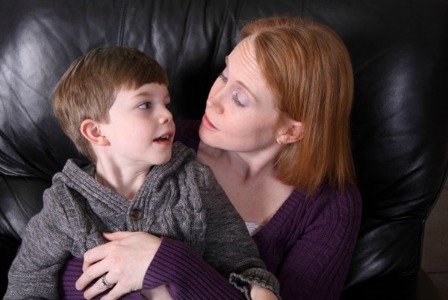
It can be daunting enough to talk to your kids about how babies are made the old-fashioned way, but with so many families created by in vitro, surrogacy or alternative insemination, you need to be ready to answer tough questions.
Test tubes, sperm banks and surrogates, oh my!
Ready, set, answer the tough question
"Where did I come from?"
Get ready, because sooner or later your child will ask the question. Many parents dread having to answer truthfully, and if your child was conceived through assisted reproduction , the answer and subsequent conversation might be a little more challenging.
How to answer Mom, where do babies come from? >>
When should you tell your child about ART?
The sooner the better, according to Iris Waichler, author of Riding the Infertility Roller Coaster. She says, "It should be age appropriate, and as the child ages, the content can become more detailed and informative. Be prepared to continue to have ongoing conversations about it. It is not a one-time conversation."
Tell the truth — even if it's uncomfortable
And what if you're worried about telling the truth about assisted reproduction? Know that it's better than the alternative.
Waichler says, "Understanding where they came from helps them understand their identities. If parents do not want to have this conversation or are not honest about how their kids came into the family, there is always a risk they will find out in a way you would not want. Also not talking about it gives a message of shame or discomfort to your kids and they will sense this from you."
One dad's story about explaining IVF to his kids
Dr. Rink Murray is a reproductive endocrinologist whose children were conceived via IVF.
Learn how men cope with infertility >>
"We told them that some mommies and daddies have an easy time getting a baby, but we did not," he says.
"We told them that we tried for a long time and had to see a lot of doctors to help us. When my son got to the age and began to ask questions, we told him that Mommy had eggs inside her that could make a baby, and the doctors took those eggs and put them in a dish. We told him that part of Daddy was mixed with the eggs and he was formed. His first home was a tiny dish. He was a miracle. We saw him when he was smaller than the head of a pin. He started as a tiny ball, a single cell. We told him, he grew in the dish for a few days and then he was placed in a tiny tube and placed back inside his mommy. Once inside, we told him that he held on tightly to Mommy and he grew."
Regardless of how your child was conceived, be open and honest and remember what's most important:
"In reality, I think the details of his conception are much less important than how we raise him," says Murray. "What my children need most are what most kids need — love, security and consistency."
More about talking to your kids
The birds and the bees and all that jazz
How to talk to your kids about sex
When should you talk to your kids about sex